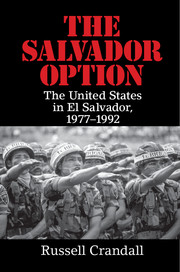Book contents
- Frontmatter
- Dedication
- Epigraph
- Contents
- List of Figures
- List of Organizations
- Acknowledgments
- 1 Introduction
- PART ONE EL SALVADOR IN THE COLD WAR
- PART TWO JIMMY CARTER
- PART THREE RONALD REAGAN
- 19 Reagan Arrives
- 20 Reagan and Salvador
- 21 El Mozote
- 22 Another Vietnam
- 23 Solidarity
- 24 Troop Cap and Certifying Human Rights
- 25 Reagan Gambles on Elections, 1982
- 26 The Shultz Doctrine
- 27 Human Rights
- 28 Henry Kissinger
- 29 Contras
- 30 “Elections Yes, Dialogue No,” 1984 Presidential Election
- 31 La Palma
- 32 Esquipulas
- 33 Counterinsurgency I
- 34 Counterinsurgency II
- 35 Zona Rosa
- 36 Air War
- 37 José Napoleón Duarte
- 38 Iran-Contra
- PART FOUR GEORGE H. W. BUSH
- PART FIVE POSTWAR
- Notes
- Bibliography
- Index
32 - Esquipulas
from PART THREE - RONALD REAGAN
Published online by Cambridge University Press: 05 June 2016
- Frontmatter
- Dedication
- Epigraph
- Contents
- List of Figures
- List of Organizations
- Acknowledgments
- 1 Introduction
- PART ONE EL SALVADOR IN THE COLD WAR
- PART TWO JIMMY CARTER
- PART THREE RONALD REAGAN
- 19 Reagan Arrives
- 20 Reagan and Salvador
- 21 El Mozote
- 22 Another Vietnam
- 23 Solidarity
- 24 Troop Cap and Certifying Human Rights
- 25 Reagan Gambles on Elections, 1982
- 26 The Shultz Doctrine
- 27 Human Rights
- 28 Henry Kissinger
- 29 Contras
- 30 “Elections Yes, Dialogue No,” 1984 Presidential Election
- 31 La Palma
- 32 Esquipulas
- 33 Counterinsurgency I
- 34 Counterinsurgency II
- 35 Zona Rosa
- 36 Air War
- 37 José Napoleón Duarte
- 38 Iran-Contra
- PART FOUR GEORGE H. W. BUSH
- PART FIVE POSTWAR
- Notes
- Bibliography
- Index
Summary
It is precisely that reality in which you are living that moved me to undertake this journey. To be closer to you, children of the church and of countries of Christian roots, who suffer intensely and who are experiencing the scourges of division, war, hatred, social injustice, ideological confrontations that beset the world and that expose to conflict innocent populations yearning for peace.
– Pope John Paul II, March 1983Speaking frankly, it is difficult in every civil war for the hatreds and passions to die.
– President José Napoleón Duarte, November 1984“Communists Win These Kinds of Negotiations”
In an endeavor to bolster regional peace efforts in an isthmus racked by revolutionary and counterrevolutionary violence, the foreign ministers of Mexico, Panama, Colombia, and Venezuela established the Contadora Group, named after the Panamanian island where the first meeting took place in January 1983. Under the informal leadership of Colombian president Belisario Betancur, five Central American governments (Guatemala, El Salvador, Honduras, Costa Rica, Nicaragua) began talks under the Contadora auspices. Within a year, the Contadora Group had come up with a draft treaty that focused on security and stability as opposed to domestic democracy. This version would have required the Sandinistas to end their aid to the Salvadoran guerrillas as well as evacuate Cuban and Soviet-bloc military personnel.
Perhaps assuming that Managua would reject it, the Reagan administration reacted positively to the draft. Remarkably, though, within weeks, Sandinista leader Daniel Ortega announced that his government supported the treaty “in its totality, immediately, and without modifications.” Citing that U.S. assistance to the contras as well as Nicaragua's dependence on Cuban and Soviet military support undermined the treaty, the Costa Rican, Salvadoran, and Honduran governments failed to embrace the draft.
By 1986, the Contadora process struggled to develop a credible program that all the regional governments would endorse, but another accord, Esquipulas II, would come to fruition. Esquipulas II was named after the Guatemalan town where it was signed by the five Central American presidents in early August 1987. Based on a plan created by Costa Rican President Óscar Arias, Esquipulas II called for an end to hostilities, open elections, and the end of external assistance to irregular actors. Of particular significance to the Salvadoran case, Esquipulas II emphasized the “incorporation of [the] region's insurgents into the political process” through “internationally supervised democratic elections.
- Type
- Chapter
- Information
- The Salvador OptionThe United States in El Salvador, 1977–1992, pp. 340 - 345Publisher: Cambridge University PressPrint publication year: 2016

